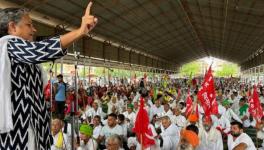Muzaffarnagar Farmer Rally: Mass Catharsis of Rural Dissent
File Photo.
The frequent spells of rain have not dampened the festive spirit at the well-known GIC Ground in Muzaffarnagar. Here, in the heart of the sugarcane-growing belt of western Uttar Pradesh, instead of farmers on bullock-carts, carpenters have been running around all week long. They are erecting poles and platforms, as electricians check and re-check the wiring for the sound systems. Preparations for the Kisan Mahapanchyat (farmer assembly) scheduled on 5 September are all but over. Hundreds of volunteers are making last-minute adjustments for a grand stage, hundreds of langars, medical camps and shelters.
The workers have turned the ground into a tiny township, ready to host 40 Samyukta Morcha (SKM) leaders and traditional khap chiefs, along with farm leaders from at least 20 states and, naturally, lakhs of farmers. On Sunday, there will be singing and cheering, and a few vocalists will raise slogans of solidarity among farmers in between the fiery speeches by their leaders.
The coordination committee of the SKM has prepared for the best scenario while considering the worst-case too—excessive rainfall, police violence, tear-gas, lathi-charge... Accordingly, it has rehearsed a contingency plan for all eventualities. The organisers say this rally will draw massive attendance; perhaps even five lakh of the peasantry will show up. Only a few of the older farmers would have memories long enough to remember the rousing farmer movements of the 1980s which drew such crowds.
The farmers have held 11 rounds of talks with the central government since their protest began (in Punjab) last summer and spread to Haryana, Uttar Pradesh, and other parts of the country. All of the talks failed. The Centre has refused to repeal its three controversial farm laws, and it has declined unconditional discussions. Instead, pro-government forces have repeatedly sought to bury the farmer movement under a slurry of hate propaganda.
The rally in Muzaffarnagar is a renewed attempt by farmers to demonstrate that they have not given up on their demands. Instead, the propaganda and pushback have only firmed their resolve. The SKM, which has been leading protests at the Delhi border since November last year, called for “Mission Uttar Pradesh” to illustrate the growing solidarity among farmers. It wants agricultural issues to sit at the top of the pile of political questions in India.
The aim of the Muzaffarnagar event is also to expose the Prime Minister Narendra Modi-led government’s pro-farm bills propaganda for what it is. It will testify to the emerging new coalition of farmers and social movements that have shaped up over the last year. It is almost certain that the farmers will impact the electoral fortunes of the ruling Bharatiya Janata Party. After all, 5 September is not a show in itself. It will kickstart a statewide campaign to discuss, debate, and firm up plans to oppose the government’s anti-farmer stance.
Nor is this mahapanchayat just an Uttar Pradesh affair. Delegates from at least 20 states, including regional farm unions and organisations, are participating. It is both a peaceful show of strength and evidence of a rudimentary all-India farmers’ political unity in the making. After months of aggressive campaigns across the country, farm leaders and the peasantry have managed to sow the idea that repealing these laws and guaranteed MSP is necessary, not a vain demand.
Remember that last year, the farmers of Uttar Pradesh were not the first to join the anti-farm law protests. They followed the Punjab and Haryana uprising. However, over time, the influential Jat farming community began leading the agitation in western Uttar Pradesh. This rally will be a test of whether other social groups and non-farmers have joined hands with them. It is what makes the Muzaffarnagar gathering a meaningful moment in the farmer’s agitation.
Just last week, there was a lathi charge against protesting farmers in Karnal town of Haryana. The repeated instances of violence against farmers has polarised the peasantry against the state government and the Centre. It is yet to be deciphered how much of the peasantry of Uttar Pradesh has joined this agitated bandwagon.
Another big question looms: how many will come on Sunday to answer SKM’s call? We only have smoke signals until the rally reveals itself. The leaders of political outfits are looking around for alliances and extending participation and support, but farmers are firmly rejecting direct political interference. Nevertheless, regional parties sense an opportunity, and it will surprise nobody if leaders attend the event.
The SKM has categorically stayed away from political parties, but its actions are deeply political. Their demands to repeal the new farm laws and make MSP a legal right have profound implications for food security. The central government’s regulations make the corporatisation of the food chain inevitable. Farmers fear that oligopolies will take over everything from production to distribution of food. Food prices skyrocketed, and farmer incomes tanked wherever this was allowed in the world. That is why the SKM has repeatedly accused the Centre of running a “pro-corporate, anti-farmer government”. Muzaffarnagar will have to show how many agree with this in the relatively prosperous western Uttar Pradesh belt.
Prime Minister Narendra Modi’s government at the Centre has antagonised farmers by refusing to hold unconditional talks with them. It unleashed police violence against them in Delhi, while the governments of Haryana and Uttar Pradesh, also ruled by the BJP, did the same. Despite farmers extending olive branches, the repeated failure to conclude talks has forced farmers to organise as a political pressure group. They recently announced a boycott of parties in Punjab. This is sure to cause political ripples. Indeed, even the Uttar Pradesh government will think twice before trying to strong-arm them with elections around the corner.
So why should ordinary Indians concern themselves about what a “handful of farmers” are doing? More than 30% of the population is food insecure or under-fed in India. More than half the children are stunted and underweight. The middle-class is economically exhausted by the lockdowns imposed to slow the spread of Covid-19. Even healthcare costs are through the roof, as witnessed during the pandemic. For all these reasons, rural and agricultural issues matter to every Indian. Further, the collective memory of corporate-driven famines should alert all citizens to the risks posed by the farm laws.
Along with these laws, the government withdrew most limits on stocking food items. This decision has reminded farmers, the underprivileged and the middle classes of the 2015 pulses scam. It has added a bitter taste to the ongoing rise in edible oil, tomato and onion prices. All these price scams and manipulations demonstrate why the same crime—hoarding—is victimising farmers and consumers at the same time. The farmers are fighting against corporate tyranny but also for their right to land and livelihood. There are lessons here for everyone.
Citizens and political parties should consider whether a government can hand over food production to foreign-owned companies, as the new laws propose. Should everything from seeds to supermarkets be in foreign hands? It is not a too-alarmist scenario, considering the experiences of farmers and consumers in the USA and Brazil. From suicides to falling incomes and growing indebtedness, farmers are traumatised under corporate-controlled “free markets”. Fed by the corporate food system, consumers are no better off.
Indians need to make careful decisions. The corporate media may be of little help to understand what is at stake. For this reason, the Muzaffarnagar event is even more critical. India needs to scrutinise each development on and off the podium, as what happens here could shape the agriculture and power politics of the future. Nobody should be off-guard. Even the leaders of the SKM are accountable now.
Thousands of people have decided to gather for their cause during the pandemic because they have lost faith that the governments will hear their cries. The recent instances of violence at the Karnal toll gates in Haryana have inflamed farmers. Administrative apathy towards their complaints has incensed them too. Farmers in the North are deeply shocked by police repression of protests and criminal and other cases filed against farmers. More are likely to gravitate towards the SKM. The rally in Muzaffarnagar will be a mass catharsis of rural dissent. The farmers are screaming their anger over the neglect of their legitimate demands.
The bigger the rally on 5 September is, the greater the chances of the government re-starting talks to placate them. The top demand of the farmers is to make MSP a legal right across a variety of crops. Either way, this meeting is a litmus test for the Modi government and a chance for concerned citizens to witness a social movement in action.
The Centre can avert a crisis and rebuild its image among farmers if it holds talks with them. However, it will need to bid farewell to its corporate friends, who are keen on agribusiness. So far, the farmers have survived one challenge after another, but Muzaffarnagar is about sending the message to all of Uttar Pradesh that the farmer’s fight is everybody’s fight. They have stood their ground and gained respect globally. If not for the love of the country, the love of truth should have us all tune into the buzz at Muzaffarnagar.
Indra Shekhar Singh is an independent policy analyst and writer on agriculture and the environment. The views are personal.
Get the latest reports & analysis with people's perspective on Protests, movements & deep analytical videos, discussions of the current affairs in your Telegram app. Subscribe to NewsClick's Telegram channel & get Real-Time updates on stories, as they get published on our website.
























